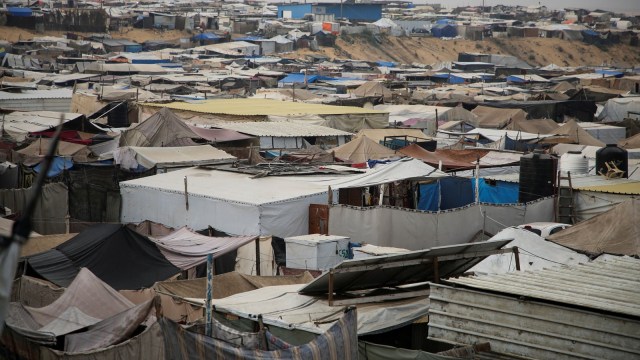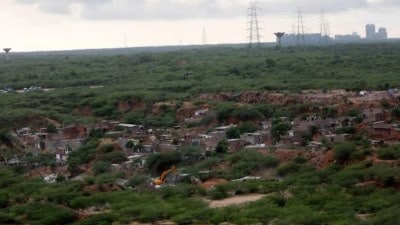Stay updated with the latest - Click here to follow us on Instagram
Israel attacks Jabalia refugee camp, kills at least 50 across Gaza
The Israeli military has encircled the Jabalia camp, deploying tanks in nearby towns with the objective of eradicating Hamas fighters.
 Residents have been instructed to evacuate to southern Gaza, yet many Palestinian and U.N. officials contend that there is no safe area in the territory. (Representational Photo/ REUTERS)
Residents have been instructed to evacuate to southern Gaza, yet many Palestinian and U.N. officials contend that there is no safe area in the territory. (Representational Photo/ REUTERS)In a series of Israeli military strikes across the Gaza Strip on Tuesday, at least 50 Palestinians were reported killed as Israeli forces intensified their operations around Jabalia, a city in the northern enclave, reported Reuters. The clashes, primarily against Hamas-led fighters, have escalated amid ongoing hostilities in the region.
According to Palestinian health officials, 17 individuals lost their lives near Al-Falouja in Jabalia, the largest of Gaza’s historic refugee camps. In a separate incident, an Israeli missile strike on a house in Bani Suhaila, eastern Khan Younis, resulted in the deaths of 10 people. Earlier in the day, an airstrike in the Sabra suburb of Gaza City destroyed three houses, claiming two lives, while 12 others remain unaccounted for. Additionally, eight fatalities were reported from a strike in the Nuseirat camp located in central Gaza.
Tragically, a doctor was killed while attempting to assist victims of the Israeli strikes in Al-Falouja, and several medics were wounded when their ambulance was caught in the crossfire. The ongoing military operations have raised significant concerns among Palestinians and humanitarian agencies about the potential displacement of residents from northern Gaza, a claim the Israeli government has denied.
In the past ten days, reports indicate that Israeli forces have demolished numerous homes in Jabalia, as the Israeli military seeks to target what it describes as terrorist infrastructure embedded within civilian areas. The United Nations human rights office has noted that the Israeli military seems to be effectively isolating northern Gaza from the rest of the territory, exacerbating the humanitarian crisis.
Adrian Zimmerman, head of the International Committee of the Red Cross (ICRC) in Gaza, emphasized the urgent need for safe evacuation routes for families in northern Gaza, where fear and confusion reign. He told Reuters, “Many, including the sick and disabled, cannot leave and remain protected under international humanitarian law. Every person displaced has the right to return home in safety.”
In response to the situation, Cogat, the Israeli military’s humanitarian unit, claimed that operations in Jabalia are aimed at dismantling Hamas fighters’ capabilities while also facilitating humanitarian aid. However, Hamas denies accusations of embedding operatives within civilian populations.
Jabalia camp encircled
The Israeli military has encircled the Jabalia camp, deploying tanks in nearby towns with the objective of eradicating Hamas fighters. Residents have been instructed to evacuate to southern Gaza, yet many Palestinian and U.N. officials contend that there is no safe area in the territory.
The health ministry in Gaza reported that the army has ordered the evacuation of three functioning hospitals in the north, but medical staff remain determined to provide care amidst overwhelming casualties. In recent days, Cogat has reported transferring patients and medical personnel from the Kamal Adwan Hospital to safer locations, as well as supplying significant fuel and blood resources to hospitals struggling to cope with the crisis.
Hamas government media director Ismail Al-Thawabta accused Israel of obstructing emergency teams from retrieving bodies, claiming the intent to dismantle Gaza’s healthcare system amid a prolonged siege lasting over 170 days.
On Monday, UN Secretary-General Antonio Guterres condemned the rising civilian casualties in northern Gaza, where over half of the 2.3 million residents of the territory reside. Following Hamas’s attack on Israel on October 7, which resulted in around 1,200 Israeli deaths, Israel’s military campaign has led to over 42,000 Palestinian deaths, according to Gaza’s health authorities.



- 01
- 02
- 03
- 04
- 05




























